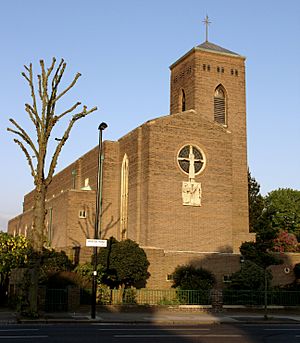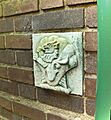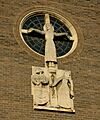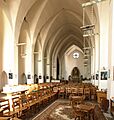St Thomas the Apostle, Hanwell facts for kids
Quick facts for kids St Thomas the Apostle |
|
|---|---|

The east face.
|
|
| 51°30′04″N 0°19′49″W / 51.5012°N 0.3303°W | |
| Location | St Thomas the Apostle Parish Office, 182 Boston Road Hanwell London W7 2AD |
| Country | England |
| Denomination | Church of England |
| Churchmanship | Traditional Catholic |
| History | |
| Founded | Foundation stone was laid on 8 July 1933 |
| Architecture | |
| Architect(s) | Edward Maufe |
| Style | Gothic/Art Deco |
| Years built | July 1934 |
| Administration | |
| Archdeaconry | Archdeaconry of Northolt |
| Episcopal area | Willesden Episcopal Area |
| Diocese | Diocese of London |
St Thomas the Apostle is a beautiful Church of England church. You can find it on Boston Road in Hanwell, which is part of the London Borough of Ealing. A famous architect named Sir Edward Maufe designed this church. It is part of the Diocese of London and can hold up to 428 people. This building is very special, so English Heritage has listed it as a Grade II* building. This means it is an important historical building.
Contents
The Church's Story
Hanwell used to be a small village. It started to grow when the Great Western Railway arrived in the 1850s. More people moved to the area, especially near Uxbridge Road. Because of this, a new church area, called a parish, was needed. The parish of St Mellitus was created in 1908.
Later, in 1906, a new tram line opened along Boston Road. This made the southern part of Hanwell even more popular. With so many new residents, the very southern part of the old St Mary's parish needed its own church.
Before the current building, St Thomas was a smaller "iron mission church." It could hold about 300 people. Money was raised to build a bigger church. The land where another St Thomas' church stood in Portman Square was sold. The first stone for the new St Thomas the Apostle church was laid on July 8, 1933. The church officially opened the next year, in July 1934.
St Thomas Today
The church is part of the Willesden Episcopal Area within the Church of England. For many years, the church had a special arrangement because it did not agree with women becoming priests. However, in 2011, the church changed its mind. Now, it welcomes women priests and works closely with the local bishop.
Building the Church
The main architect for St Thomas the Apostle was Sir Edward Brantwood Maufe. The church has a unique design. It faces northeast and has a tall, square bell tower on its northern side. The tower has a green copper roof.
The outside of the church looks simple and is made of brown-silver-grey bricks. These bricks are thought to have come from Tondu in Wales.
Special Art and Carvings
A famous artist named Eric Gill created a carving of the Calvary on the northeast side of the church. This carving is part of the east window. Gill carved it right there on the building from a single block of limestone.
Another artist, Vernon Hill, carved a special keystone above the northeast entrance.
Inside the Church
The inside of the church is very different from the outside. While the outside has straight lines, the inside has smooth, curved Gothic pillars. These pillars lead your eyes up to a high, fan-shaped ceiling.
If you stand at the back of the church, you can see how Maufe made the space feel very large. He put the bell tower to one side, which allowed the ceiling to stay at one level. The ceiling is made from reinforced concrete. This was a new building method at the time. It is thought that this church helped Maufe test this technique before he used it for his design of Guildford Cathedral.
The Font and Windows
Also at the back of the church is a stone font. This is where baptisms happen. It is octagonal (eight-sided) and was also made by Vernon Hill. In the middle of the font, there is a carving of a fish wrapped around an anchor. This is a special symbol. The Greek letters ΙΧΘΥΣ (Ichthys) are carved vertically on the side.
High up in the west window, the lead lines form the Labarum symbol. This symbol looks like the Greek letters Chi (χ) and Rho (ρ) put together.
The church has aisles on each side. As you walk down them, the light changes, making the windows at the eastern end look like bright stars. The main windows are tall and narrow, made of clear, handmade glass. Maufe chose not to use factory-made glass. This shows the influence of the Arts and Crafts movement at the time.
Maufe used light and shadow to make the church feel rich and grand, like much older cathedrals. But with its simple shapes and Art Deco style, it also feels very modern.
Symbols of St Thomas
The symbol for St Thomas the Apostle is a fan of three spears with a builder's square. This symbol appears many times in the church. You can see it in the tall windows and in the oval window above the porch. It is also on the iron gates near the east wall and on the drainpipes outside the building.
Images for kids
-
Sir Edward Brantwood Maufe's stone seal at the base of the tower.
-
The Calvary which forms the east window by the British sculptor Eric Gill.
 | Roy Wilkins |
 | John Lewis |
 | Linda Carol Brown |











